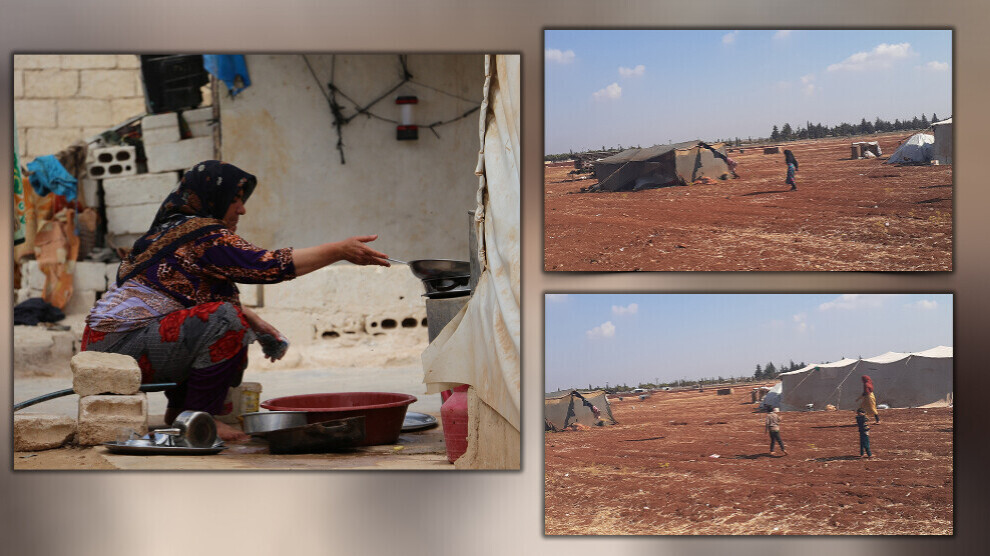Women struggle to live against poverty in Idlib’s refugee camps
Women living in the refugee camps located in Idlib face difficulties in accessing their fundamental needs such as food, health services, electricity, and water. They expect help.

LÎNA EL-XETÎB
Idlib - Women living in the refugee camps located in and around Idlib face many difficulties due to the lack of security and health centers. Poverty and bad living conditions negatively affect their daily lives. Despite all difficulties, they struggle to live.
“We cannot afford to buy gas”
31-year-old Marwa El-Hemadi lives in one of the refugee camps located in the Şex Behr town of Idlib. She lights a fire with papers collected by her children to cook for her family.
“Due to the high cost of living, poor living conditions, we cannot afford to buy gas. In 2020, I was forcibly displaced from Seraqib along with my husband and five children. We have to live in this camp. In our hometown, we were farmers. What makes me sad the most is that my children are deprived of their right to education because there is no school in the camp. My children have no future; they have to have an uneducated life. My 13-year-old son helps his father in the quarry while my 10-year-old daughter helps me with daily chores,” she told NuJINHA while talking about the difficulties they face in the refugee camp.
“I walk four kilometers in order to go to the health center”
55-year-old Selma El-Cumah is from Taqana village of Idlib but she has lived in a refugee camp located in Idlib’s Kefer Uruq town. She suffers from many diseases such as diabetes and atherosclerosis and she has faced many difficulties because there is no health center in the camp.
“I have to walk four kilometers in order to go to the health center in the city center. Due to the current poverty and high prices of medicines, I cannot buy my medicines. I sell food in the food box given to me in order to meet my most basic daily expenses.”
“We all use the same bathroom”
28-year-old Helima Necar lives in a refugee camp with her husband and children. She told us that many women complain about water shortage power cuts in the camps, adding that she suffers from the same problems faced by other women in the camp because there is no security in the camps and women’s freedom is limited. “We are so embarrassed because we all use the same bathroom; the ongoing electric cut-outs and the lack of cleaning materials make our bad situation worse.”
“My responsibilities lead to stress”
36-year-old Ruqaya Al-Zaydan was forcibly displaced from her village Heiş to a refugee camp in the city of Sarmada. She has had many responsibilities since she lost her husband. She told us that she has to leave her four children alone because she has to work in a cafeteria. “After my husband died, I had to work to take care of my children. I work eight hours per day for a low wage. After working in the cafeteria, I work as a house cleaner. The heavy responsibilities on my shoulders lead to stress and physical fatigue,” she told us.
“Human rights organizations should take action”
Speaking about the difficulties faced by displaced women, sociologist Selam Ebd Al-Jawad said, “Women suffer from many difficulties due to the lack of security and limited opportunities in the camps. Human rights organizations should take action for these women. They are away from their peaceful life in their homelands; they have to live in camps and tents. They have faced many difficulties in accessing their fundamental needs. These women have the right to live in a house, meet their basic needs.”
